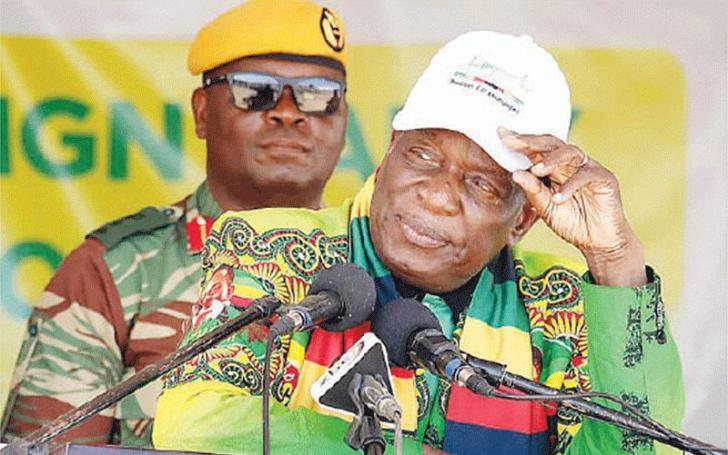News / National
Army roadblock for Mnangagwa
06 Sep 2024 at 16:16hrs |
0 Views

As President Emmerson Mnangagwa seeks to extend his term beyond the 2028 constitutional limit, despite his public claims of upholding constitutionalism, the military stands as a significant obstacle.
Online publication Newshawks claims that sources within the military inform the that Mnangagwa will be prevented from pursuing any constitutional changes to prolong his presidency, a move currently being pushed by his party, Zanu PF. The military is expected to leverage its institutional and operational power to block any such succession efforts.
Mnangagwa is engaged in a fierce internal power struggle with Vice-President Constantino Chiwenga, who supported his rise to power through a 2017 coup. The battle for control over state resources and political influence is intensifying.
A military insider stated: "The army's stance is unequivocal. The President is required to complete his constitutional second term and retire in 2028. From a military perspective, he should not have even been eligible for a second term. Although he publicly agrees to retire in 2028, he is privately signaling his supporters to push for a constitutional amendment to extend his term until 2030. This proposal is unpopular among the security forces and the general public, with only a few self-interested individuals supporting it."
Despite Mnangagwa's attempts to consolidate power, the military remains a decisive force in Zimbabwean politics. A recent report by the Zimbabwe Democracy Institute underscores the military's crucial role: "The military has historically played a central role in Zimbabwean politics. As ZANU PF faces a significant succession battle, the military's influence in intra-party politics will become more apparent, although it has not been overtly visible yet. The military is unlikely to remain passive in selecting Zanu PF's new leader and the country's head of state.
"It is probable that the military will exercise veto power in leadership elections, as it has done in the past. The office of the head of state is seen as requiring military credentials, and this likely extends to the Zanu PF leadership position as well. Consequently, the successor to President Mnangagwa is expected to be a military figure or a candidate backed by the military, rather than a civilian politician.
"The ongoing succession debate within Zanu PF, characterized by factionalism, creates a volatile scenario. Understanding the military's internal dynamics and its stance on extending Mnangagwa's presidency requires thorough research.
"Despite 44 years of independence, the military remains a cornerstone of power in Zimbabwe, as seen during the 2017 coup against Mugabe. The next leader will need strong military connections to succeed in a party lacking a structured leadership succession plan.
"The military's influence is profound and enduring, shaping both Zanu PF and the broader political landscape. Addressing these dynamics is crucial for Zimbabwe's path to democratic governance and upholding constitutional principles."
Online publication Newshawks claims that sources within the military inform the that Mnangagwa will be prevented from pursuing any constitutional changes to prolong his presidency, a move currently being pushed by his party, Zanu PF. The military is expected to leverage its institutional and operational power to block any such succession efforts.
Mnangagwa is engaged in a fierce internal power struggle with Vice-President Constantino Chiwenga, who supported his rise to power through a 2017 coup. The battle for control over state resources and political influence is intensifying.
A military insider stated: "The army's stance is unequivocal. The President is required to complete his constitutional second term and retire in 2028. From a military perspective, he should not have even been eligible for a second term. Although he publicly agrees to retire in 2028, he is privately signaling his supporters to push for a constitutional amendment to extend his term until 2030. This proposal is unpopular among the security forces and the general public, with only a few self-interested individuals supporting it."
"It is probable that the military will exercise veto power in leadership elections, as it has done in the past. The office of the head of state is seen as requiring military credentials, and this likely extends to the Zanu PF leadership position as well. Consequently, the successor to President Mnangagwa is expected to be a military figure or a candidate backed by the military, rather than a civilian politician.
"The ongoing succession debate within Zanu PF, characterized by factionalism, creates a volatile scenario. Understanding the military's internal dynamics and its stance on extending Mnangagwa's presidency requires thorough research.
"Despite 44 years of independence, the military remains a cornerstone of power in Zimbabwe, as seen during the 2017 coup against Mugabe. The next leader will need strong military connections to succeed in a party lacking a structured leadership succession plan.
"The military's influence is profound and enduring, shaping both Zanu PF and the broader political landscape. Addressing these dynamics is crucial for Zimbabwe's path to democratic governance and upholding constitutional principles."
Source - online
Join the discussion
Loading comments…
































